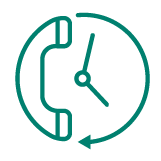5 easy financial habits to help you spend smarter, save more, and meet your financial goals
Managing and improving your financial wellness is all about replacing bad financial habits with good ones. Like changing any habit, the first step is always the most important.
Habits are regular behaviours that fine tune your borrowing to stay on top of debt over time. Like that muffin with your takeout coffee each morning, a habit becomes part of your regular routine—even if it's something you know might not be all that good for you.
Changing your financial habits is much easier if you can always try to keep sight of these four guiding principles:
- Have goals to work toward
- Make good financial decisions
- Use the right tools
- Regularly review your finances with an advisor
Here are five good financial habits to help you stay on top of your finances and look ahead to a brighter financial future.
1. Review your budget at least once a month
Creating a simple budget helps you track your weekly or monthly income and expenses—and keep sight of your big picture financial goals. A budget should include:
- Goals you are saving toward
- What you plan to spend
It's important to review your budget at least every month to track goals progress and check you aren't spending more than your earn or overspending in particular areas. The aim is to always keep your expenses within your income, while staying on track to achieve your goals.
The Government of Canada has a useful, and easy-to-use, online budget planner to help you create your first budget.
See
2. "Set it and forget it" to save more money, faster
For many of us, one of the biggest barriers to saving is simply remembering to do it. The solution is to let modern online banking technology take the strain.
Automating payments from your chequing account into a savings account lets you "pay yourself first" each paycheque cycle. If it's a predetermined amount you know you can afford because you've plugged it into your budget as a regular expense, you won't even know you're doing it—until you check your savings balance and see how fast it's growing.
Here's how to set up an automated savings plan:
- Set savings goals: Create some savings goals and include them in your budget
- Open multiple accounts: Open different savings accounts for different saving goals
- Automate payments: Set up recurring, automated transfers to help you meet your goals quicker
- Reward yourself: Build micro-goals into your budget to reward yourself for being a champion saver with a meal out or other treat every time you achieve a saving goal
It's amazing how just a small amount saved each month can add up over time.
3. Always have three to six months in cash reserves
Life rarely goes exactly to plan. Be prepared to weather any storms that come your way by always having some easy-to-access cash in reserve. Money squirrelled away in an emergency fund can help you over the following bumps:
- Major unexpected expenses such as repairs to your home or car
- Loss of income due to illness or losing your job
- Illness to a loved one that makes it hard for you to work
- An unexpected event that reduces your income or increases expenses
Aim to build an emergency fund that can cover at least three to six months of essential expenses. Here's how to build that fund to give you peace of mind in future:
- Decide how much to save: Add up all of your essential monthly expenses and multiply that by the number of months you want to be prepared to cover.
- Set a saving deadline: Set a realistic date by when you can have your emergency fund saved and ready to use if needed.
- Open a dedicated savings account: Open a separate savings account and call it "Emergency Fund" in your online banking.
- Set it and forget it: In your online banking, set up recurring payments of an amount you can afford to save each week or month.
In Canada, we're doing pretty well. According to the Government of Canada, 64% of us had some emergency savings before the COVID-19 pandemic hit in 2020. Always having an emergency fund gives you peace of mind that you and your family are covered during tough times.
4. Regularly review your protection
While an emergency fund can help you cover your expenses for a few months if something happens, a protection plan aims to cover you and your loved ones over the longer-term. Insurance helps you to:
- Minimize financial losses due to unexpected events
- Protect your assets and financial investments
- Reduce the need to eat into your savings or take on more debt, which could mean having to abandon or delay your financial goals
It's important to regularly review your insurance needs as things change in your life over time. For example:
- Car usage: Are you driving farther to work for a new job?
- Home occupants: Do you now have tenants in a suite or a homestay student?
- New dependents: Do you need to update your beneficiary or expand your life insurance protection with the addition of a new baby?
Few things in life stay the same for long. Regularly reviewing your insurance needs makes sure you're always protected.
5. Schedule annual financial wellness checks with an advisor
Do you go to the doctor for a regular check-up? Think of reviewing your plan annually with an advisor as your financial wellness check. Talking to a financial advisor can help you to:
- Create goals and develop a financial plan to achieve them
- Find gaps in your financial planning, such as insurance
- Navigate more complex topics, such as investments
- Pay down debt faster, including by consolidating loans into one place
- Provide recommendations for the best financial products for your needs
Meetig with your advisor regularly, at least every year, can help you keep your finances in shape by:
- Keeping you focused on your financial goals
- Finding places to fine-tune your spending habits, reduce debt, or save more
- Making adjustments that reflect changes to your life or financial situation
Ready to improve your financial wellbeing? Even the smallest of first steps can eventually result in big improvements.
What's next?
Contact us to discuss your financial wellness, including how to spend smarter, save more, borrow wisely, and plan for the long-term. We've got your back.
Other articles you may be interested in:








